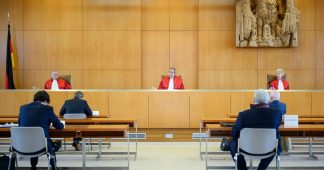Berlin Admnistrative Court rules socialist ideas are “anti-constitutional”
By Peter Schwarz
Nov. 19, 2021
The Berlin Administrative Court dismissed the lawsuit brought by the Socialist Equality Party (SGP) against the Federal Ministry of the Interior and ordered the party to bear the full legal costs for the case on Thursday. The SGP sued the ministry on January 24, 2019 because it had listed the party as “left-wing extremist” in its annual Verfassungsschutz Report since 2017, which allows the secret service (the Federal Office for the Protection of the Constitution) to carry out surveillance on it.
The ruling, which the SGP will appeal, has far-reaching consequences. It stands in the tradition of National Socialist ideological jurisprudence (Gesinnungsjustiz) and Bismarck’s anti-socialist laws, and opens the door for the surveillance and suppression of all opposition to capitalism and arbitrary state power.
The court unreservedly supported the secret service, a democratically illegitimate institution with close links to the far-right milieu. The presiding judge Wilfried Peters, who is also the vice-president of the court, and the representatives of the Ministry of the Interior, Attorney Professor Dr. Wolfgang Roth and state secretary Reinfeld worked together like a well-oiled machine during the proceedings.
The Ministry of the Interior declared in its answer, authored by Roth, to the SGP’s complaint that “fighting for an egalitarian, democratic and socialist society,” criticising militarism and nationalism, and rejecting the European Union was unconstitutional. The court went even further and also declared any criticism of the state to be inadmissible. There are in the program of the SGP, “considerable points that give reason to assume that the plaintiff wants a different state and a different legal system,” said Judge Peters in his preliminary oral judgment.
Sections from the SGP’s Statement of Principles which declare that the state “does not stand as a neutral arbiter over social conflicts” and defends “the political rule of the capitalist class,” and the declaration that its very existence proves “that society is divided into irreconcilable classes” were deemed by the judge to be an attack on the constitution. “The classes are irreconcilable, that sounds very unpeaceful, sounds like war,” he commented. “From this one can deduce that they want a different system, a different state, a different constitution.”
The court declared Article 14 of Germany’s Basic Law, which protects private property, to be an inviolable part of the free democratic basic order. Not a word about this article is found in Section 4 of the Federal Constitutional Protection Act, with which the court justified the judgment.
“The Basic Law may not provide a very clear economic order, but a market-based property order,” said Peters. “Article 14 of the Constitution is therefore a freedom law. But you don’t acknowledge that. You question the private ownership of the means of production.”
The judge repeatedly insinuated that the SGP was seeking a violent overthrow by a minority. He quoted from the “Statement of Principles of the SGP,” which says, “In the course of revolutionary mass struggles, new organs must be built that allow the working class—that is, the majority of the population—to have genuinely democratic participation.”
“That is something unpeaceful. This is a matter that should be cleared up in a Verfassungsschutz Report,” he commented.
The representatives of the SGP—party chairman Ulrich Rippert, his deputy Christoph Vandreier and lawyer Dr. Peer Stolle—defended the goals and the program of the SGP during the more than two hours of proceedings. Rippert emphasised that basic democratic rights in Germany had been fought for by the Marxist labor movement and that the SGP was striving to expand democracy, especially to economic affairs.
Vandreier made a statement at the beginning of the hearing, which we publish separately in full. It dealt with the historical and current political background of the lawsuit.
Turning to the court, Vandreier warned that a decision in favor of the secret service and its anti-democratic arguments would have far-reaching consequences: “Seventy-six years after the end of the Nazi regime, socialist ideas would again be declared unconstitutional. This would create the basis for the secret service surveillance and ostracism of bookshops that offer Marxist literature, critical scholars, and striking workers. It would be a step toward a police state.”
After initial attempts to stop Vandreier, Judge Peters let him finish speaking. But in his judgment, he arrogantly brushed aside all his warnings. “Today we heard a lot about history, about Bismarck’s laws, arguments about Karl Marx, etc.,” he said. But all of this is “not relevant” here. The only question is whether the SGP’s program violates the free democratic basic order.
The court rejected two requests from the SGP—to obtain a scientific report and to summon the former President of the Verfassungsschutz, Hans-Georg Maassen, as a witness. The litigation value, on the basis of which the legal costs are calculated, was set at €20,000, four times as much as usual. Since the SGP was mentioned in a total of four different Verfassungschutz reports due to the long period between the filing of the suit and the hearing, the court applied the usual litigation value of €5,000 to each individual report.
Published at www.wsws.org
We remind our readers that publication of articles on our site does not mean that we agree with what is written. Our policy is to publish anything which we consider of interest, so as to assist our readers in forming their opinions. Sometimes we even publish articles with which we totally disagree, since we believe it is important for our readers to be informed on as wide a spectrum of views as possible.











